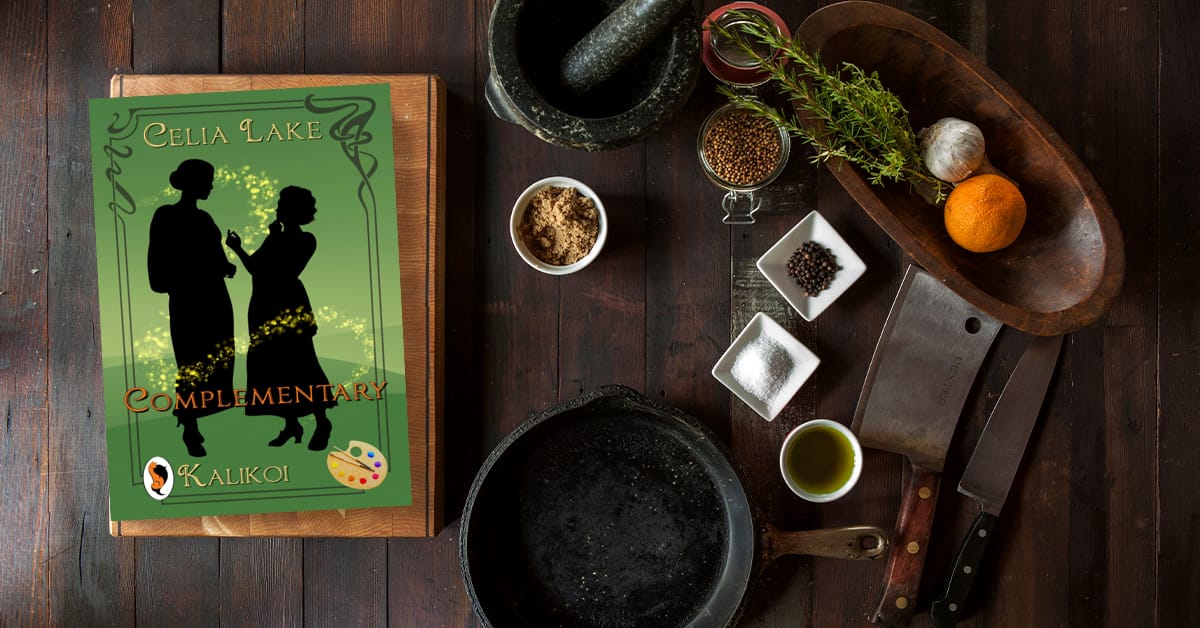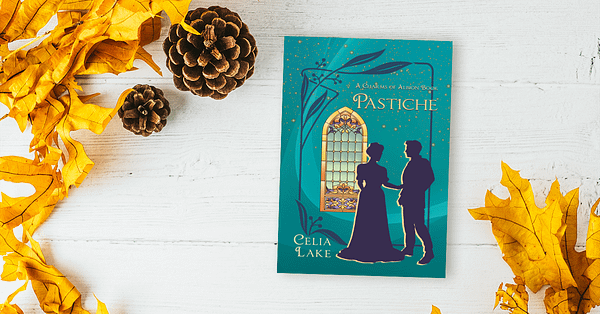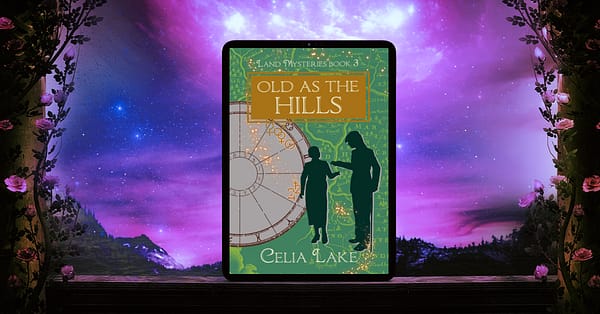I adore Mason (everyone calls Elizabeth Mason that.) Her background and the role she has in my books has grown over the years.

Background
Elizabeth Mason was born in June 1866 in Trellech, Albion’s magical city. Her family are colourmen, people who create pigments for paints and inks. Her grandfather was Dutch and married a Malaysian woman, their daughter then married an Englishman and settled in Albion. There is, of course, a long history of trade both from Dutch and British sources in Malaysia, especially around import materials.
There’s a brief comment about the family in Elemental Truth (out in December!). At that point it’s 1889. Vitus mentions that the business is two brothers, two sisters, one of their husbands, and two daughters in the next generation (one of whom is our Mason, in her apprenticeship as a Penelope).
We also see one of Mason’s Dutch cousins, Grietje, in Old As The Hills. Grietje’s two generations younger (she’s 33 in that book to Mason’s 74). That book doesn’t get into what happens to Grietje, but she stays in Albion until she can reasonable return to the Netherlands.
Education
Mason attended Alethorpe, one of Albion’s Five Schools. Alethorpe focuses a great deal on crafting. She went in expecting she might follow in the family business – and she certainly has a number of skills with pigments and inks. But there she met Agatha Witt.
Unlike Schola’s house system, Alethorpe assigns students in their second year. The first year, students are assigned more or less randomly. As they settle on a speciality, they’re assigned to houses with others of compatible interests. That doesn’t mean the same skills – it means people who might learn from each other or who have specialities that rely on each other. (For example, we see Lynet and Ellis in Bound for Perdition, book binder and paper maker. Or Cassie and Greer, as a dressmaker and cloth dyer in In The Cards.)
Witt and Mason
Witt and Mason do actually have a lot of overlapping skills, but they come at them from different directions, especially during their time at Alethorpe. Mason began with all the artistic ones – making inks and paints but also how to use them, sketching and painting. Witt began with an interest in materia and incantation.
Mason and Witt have been close for a terribly long time – since they were 13 or 14. They’ve been working partners since they began with the Penelopes, and they complement each other wonderfully. Mason is a force of chaos, and Witt is made of order. Where other people might be frustrated by that (and they are sometimes too), they mostly manage to make the most of it and get the best of both perspectives.
However, they absolutely cannot stand to be in each other’s working spaces. (Social events, they’re fine. . Or at least they cope with the other’s preferences much better.) When they’re working, they have to go find a free workroom or more neutral space to talk for any length of time.
(Only some of this is that Mason definitely has what we’d call ADHD today: there are ways it serves her well, and there are ways it’s not helpful to her. Great for ‘picking up this conversation from three weeks ago without missing a beat’, not so great for turning in paperwork at reasonable intervals.)
Penelope
Witt started her apprenticeship a week before Mason (technically). Witt’s also older by about 9 months (her birthday is mid-September 1865). In Three Times Told, Mason reflects on the slight difference of seniority. If you pay close attention to how Gabe addresses them together, he will swap which name comes first each mention. Because when it comes down to it, the seniority is sort of an illusion. It amuses both of them.
Once they began their apprenticeships, both Mason and Witt got taught the wide range of investigative skills the Penelopes use. These involve a range of magical approaches. Mason picked up additional background in Materia and Incantation, and she’s also got a solid dose of practical ritual work.
Like all Penelopes, she takes on a wide variety of cases. There’s one notable one, where there’s a gap if you know about Richard, in Wards of the Roses. Mason’s not mentioned as working on that (nor are the other Penelopes, until late in the book).
In The Fossil Door, Gabe explains why. Mason was one of the first people to investigate it. When she tried a ladder over the wall of the manor house, some great force threw her back. She broke her arm and had other issues with her magic for weeks after. (This is also part of why Gabe’s not working on that problem: Richard is in fact terrified something worse might happen to him.)
Here’s what Gabe says about the aftermath:
She’d been plagued both with a sense of persistent vertigo and – worse, she said – an odd song that played on and on, like no other music she’d ever heard, she said. That had only eased six weeks later at the end of July. He had been sent along as the sacrificial offering to her boredom, to keep her entertained, in any remnant of his free time. It had been by the universal agreement of every other Penelope and both his parents.
The Edgartons
By 1906, Mason is well established as a Penelope. She’s 40, well into her prime, not particular senior, but entirely competent. She and Witt have become Richard Edgarton’s preferred Penelopes to deal with. They’re fairly close in age. (Richard is 34 at this point).
But perhaps more relevant is that Richard particularly appreciates the gifts their synergy brings. While Richard is a man of deeply rooted tradition, he appreciates people who get things done and who are committed to excellence. (Also, both of them appreciate Alysoun and love getting time with her, which doesn’t hurt anything here.)
In the wake of the other events and choices of Pastiche, they both become closer to the Edgartons, socially as well as professionally. Within a year so, they’re chosen aunts to both Gabe (6 or so at that point) and Charlotte (4ish).
There are some brief mentions in multiple books about how Alysoun, Mason, and Witt collaborate on helping get women out of difficult marriages. (Via evidence for divorce or oaths that mitigate the worst of whatever is going on.) Alysoun is more likely to be able to approach women of the Great Families in those situations and be listened to, while Mason and Witt can figure out what evidence would help or what options might function best.
Gabe and Charlotte
As Gabe and Charlotte Edgarton get older, they establish their own relationships with Mason and Witt. Mason makes a point of teaching both of them a fair bit of cooking, both practical British and some of the Malaysian dishes. Growing up in a large estate, neither of them does their own cooking regularly, but Mason believes this is a key skill. Charlotte demonstrates her skills with a number of dishes in Perfect Accord.
And Gabe, well. Gabe isn’t quite sure when to date his apprenticeship as a Penelope, but sometime before he was nine. By the time he was eleven or so, Mason and Witt were actively setting a course for him, and by the time he’s a couple of years into Schola, they’ve figured out a range of projects that will set him up brilliantly. Gabe is in fact made to be a Penelope, the way his own natural gifts and inclinations are.But part of the reason he has the shortest formal apprenticeship in centuries is that he started early. (We’ll come back to Gabe’s book in the art section.)
Her romance
In 1910, Rosemary Ditson turns up with something odd she’s discovered, and speaks to Richard Edgarton about it. That’s the opening chapter of Complementary. He immediately calls in Mason, because it involves a non-magical artists’ colony. Mason and Rosemary go off, pretending to be casual friends, but a romance develops when they’re thrown into close proximity.
Mason honestly never expected to settle down with someone. She absolutely hadn’t expected to find someone who could tolerate her odd schedule. But Rosemary’s a midwife, with plenty of odd scheduling of her own, and a reasonable tolerance for Mason’s tendency to pile any flat surface with art, materia, books, and anything else that will stay put.
(Witt remains unpartnered romantically for the rest of her life, though she has a number of close friendships, especially with Lucy Doyle, her favourite apprentice.)
Art skills
If you need an artist for an assignment, Mason likely to be the one on call. We see this in Pastiche, then in Complementary. Mason pulls the techniques she figured out in Pastiche, using sympathetic magic principles to rule out certain provenances with artwork, into use in Facets of the Bench.
It becomes clear in Pastiche that she has a hobby of a little light art forgery. She and several friends get together to try out forging new challenges. On one level, this is a tremendous test of skill and ability to take on a number of different styles – and thus useful for investigations as a Penelope. And on another, it’s just plain fun, and plays into all Mason’s trickster delights. As Mason says:
“Can’t untangle some things without knowing how they’re made. I make forgery copies as presents for friends. Properly labelled. Journals belonging to mistresses of kings, or for that matter, queens. The sort of herbal that makes sense for about ten pages and then gets increasingly more bizarre.” She flicked her fingers. “Some friends and I have a habit of coming up with things and swapping them. It keeps our hands in.”
In Complementary, she brings a sample with her to the initial meeting, at Richard’s request. She’s been working on a copy of a Scottish herbal, using inks made from regional plants. She also brings a number of sketches and other works in progress with her.
But one of Mason’s greatest works is the book that she makes Gabe for the end of his apprenticeship. In The Fossil Door, Gabe shares it with Rathna (as a particular step into one kind of intimacy). Here’s just part of that description, from Rathna’s point of view.
Any one part of it might have been a solid journeywork for a painter or an artist who worked in books. The combination was a masterwork, even before considering the text and content. There were dozens of artistic styles, many of which she could barely name. Secretary hand, Gothic lettering, Greek letters, what she thought might be Phoenician, some Egyptian hieroglyphs, alchemical symbols, a set of squiggles that must mean something to someone.
The art was just as varied. It ran from something that evoked the earliest of the cave art with a raw ochre, to exquisitely detailed paintings that might have been a photograph. The bulk of it held to that mediaeval and Renaissance style, but even there, it was so varied that to believe it came from one hand beggared belief.
“Does your Aunt Mason ever actually sleep?” It wasn’t what she’d meant to ask, but it made Gabriel arch back and roar with laughter.
“Yes, she does, I have been told. That is – that is the result of thirty years of practice, teaching herself how to do all the hands and the styles. And it’s…” He cleared his throat. “That was my present, when I finished my apprenticeship. I had no idea. She’d been working on it since I was eight. All the things she’s learned about looking at a case, all the hints and tricks. It makes sense to me, it’s meant to be a memory palace, more than every detail written down.”
The Second World War
By the time we get to the Second World War, both Mason and Witt are in their 70s. Sensible people – even in Albion, where people are fairly vigorous into that decade – might retire. While Mason and Witt have turned over a lot of more active investigation, they are continuing to act as leaders among their peers (such as the meeting at the beginning of Old As The Hills, and coordinating and training and consulting on all manner of problems.
Everyone hopes that at the end of the war, they can move to the amiable consulting when it pleases them, with less of the necessity of crisis.
(And again, we’re back to the fact that one of the reasons I don’t want to write into the 1950s is I’d have to deal with people dying of old age: Magni, Gil, and then Mason and Witt are the especially hard ones.)




